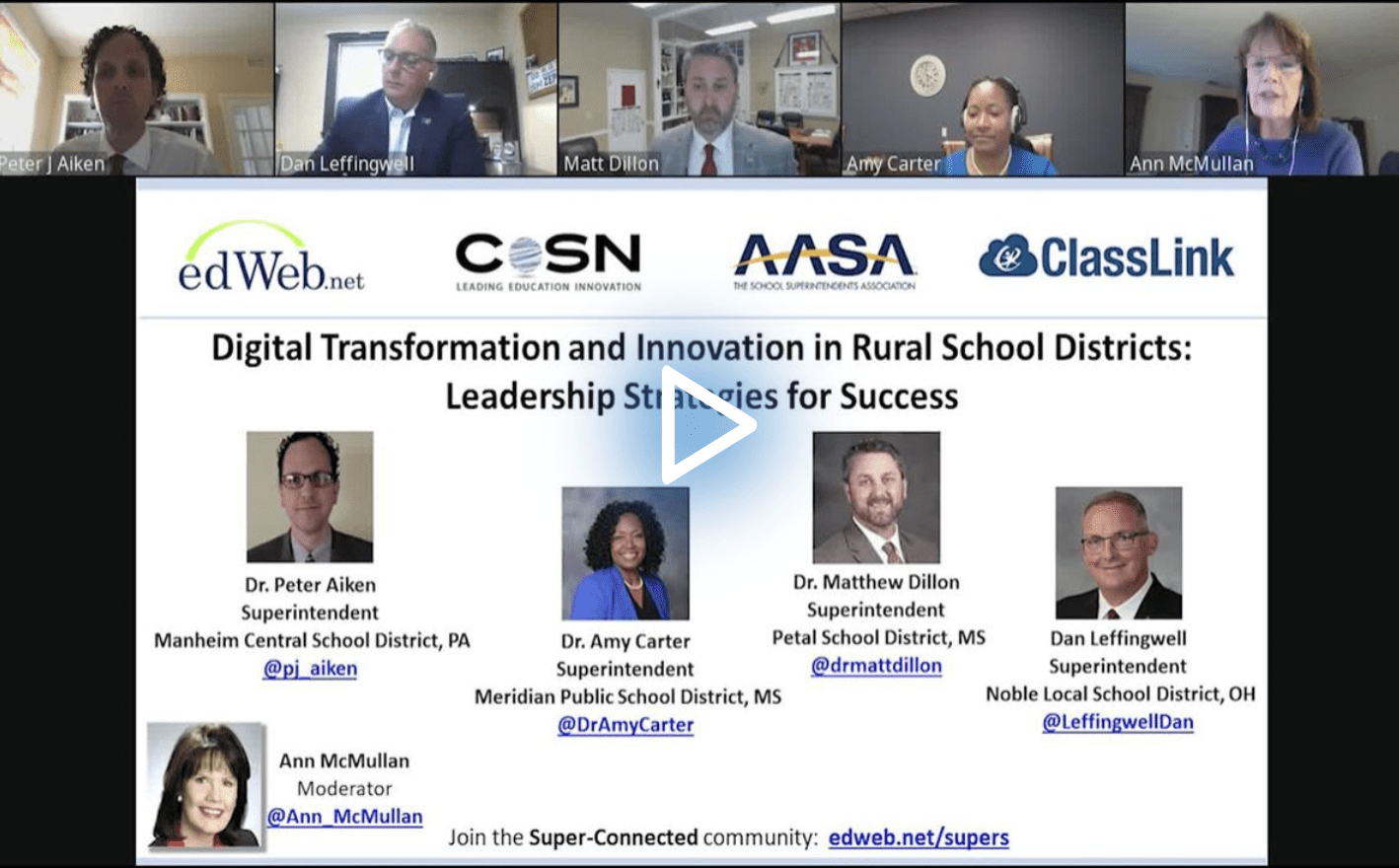Digital Transformation and Innovation in Rural School Districts
According to a CoSN report, more than half of school districts and about one-third of public schools in the United States are in rural areas. Rural communities have unique challenges, ranging from poverty and vast travel distances to a lack of affordable internet access.
In a recent edWebinar, sponsored by ClassLink and co-hosted by CoSN and AASA, Ann McMullan, Project Director for CoSN’s EmpowerED Superintendent Initiative, stated, “The last 18 months have taught us that we have many challenges and opportunities. However, the bigger the challenge, the bigger the opportunity.” The four rural school district superintendents featured in the presentation reflected on the challenges and opportunities that have led to digital transformations and innovations in their districts.
Challenges
These rural districts face the four significant challenges: broadband access, funding, people, and understanding the “why.” Broadband access has become more critical in the last year and a half than ever before. All four superintendents agreed that having solid foundations before COVID-19 has been instrumental in supporting both families and staff with remote learning. Partnering with local cable companies, internet providers, and community organizations, they expanded broadband to the school parking lots and community centers. In the Meridian Public School District, Dr. Amy Carter’s district, it was about accessibility and affordability for the families they serve. They found themselves needing to expand broadband so families that lived in housing areas could tap into the internet access from those means.
Wherever the location, funding is always a challenge for educational leaders. Leveraging new funding opportunities such as E-Rate or ESSER, the superintendents faced with unique challenges used the funding sources thoughtfully. Dr. Matthew Dillon and Dan Leffingwell emphasized the importance of sustainability. “When you get these pockets of one-time money, you have to be careful…if you make a big purchase all at one time you know what’s going to happen in four to five years, you’re going to have to make another big purchase, so it’s important to spread [the funding] out,” said Dr. Dillon. Leffingwell said it is critical to have a long-term plan that focuses on innovation and a shift away from a paper-and-pencil world.”
Another challenge of navigating a transition to digital transformation is recognizing people do not like change. Bringing staff, students, and families along required these rural districts to add instructional technology positions, train and support teachers, and educate the local and school communities on the importance of linking their students’ education with their future employment opportunities.
All presenters agreed that communicating and getting stakeholders to understand the “why” is critical to sustainable digital transformation and innovation. All agreed with Dr. Peter Aiken, who said, “You can sit in a board room or you can sit in Zoom sessions with your leadership team and you can come up with these ideas, but unless you create that pipeline of communication…and really listen to your people and your constituents to hear what’s working for them and what’s not working for them, to let them know that they have a voice through all this, I think that’s the most powerful thing…Taking that feedback and growing from it, I think that helps to sell your ‘why.’ If people feel as if they’re being listened to and heard, to me, that’s half the battle.”
Opportunities
While rural school districts face many obstacles, especially as they move education into the digital world, they have some opportunities that might differ from large, urban communities. First, being a small district, change can happen more quickly and it is easier to involve the entire school community. Second, it also means the school district is the center of the rural community and partnerships are quicker to develop. Lastly, while many districts struggle with hiring and retaining teachers, it is less of an issue for rural districts because teachers frequently grew up in the district and stay to teach and support their community.
This edWeb broadcast was sponsored by ClassLink and co-hosted by CoSN and AASA.
Watch the Recording Listen to the Podcast
About the Presenters
Dr. Peter Aiken is currently the superintendent of Manheim Central School District. He is passionate about preparing students for a world that gets crazier by the day. Dr. Aiken began his teaching career in Norfolk, VA as a reading teacher. He returned to Pittsburgh as a high school English teacher. On his way to becoming a superintendent of schools, he has served and garnered tremendous leadership lessons as an assistant principal, principal, and assistant superintendent. Dr. Aiken’s core leadership tenet is everything rises and falls on relationships. Originally from Oakmont, PA, a suburb of Pittsburgh, Dr. Aiken now resides in Lancaster, PA, with his wife and three kids. He is an avid reader, often found running and ruminating after a great read. You are invited to connect with him on Twitter and share your favorite leadership book at @pj_aiken. You can also read his leadership blog at www.educationrewired.org.
Dr. Amy Carter is Superintendent of Meridian Public School District, Mississippi. Dr. Carter has a long history of service in Meridian Public School District, having worked there since 1994. Over the years, Dr. Carter’s multiple roles in the district included classroom teacher, building-level administrator, and a number of district-level administrative positions, including Assistant Superintendent of Accountability, Operations, Student Services and Title IX Coordinator.
Currently, Dr. Carter serves as the president of the Mississippi Association of School Superintendents. She is also on the board of PREPS (Program of Research and Evaluation for Public Schools) headquartered at William Carey University in Hattiesburg, Mississippi. Dr. Carter has been honored as the Administrator of the Year by the Mississippi Alliance for Arts Education for making a difference in arts education in both school and community. The PREPS organization recently honored Dr. Carter with their Dan Merritt Courage Award.
Dr. Matthew Dillon is a native of Columbia, Mississippi. He received his bachelor’s degree from The University of Southern Mississippi in elementary education. He received his M.Ed. and Ph.D. from The University of Mississippi in educational leadership. Dr. Dillon has taught in elementary and junior high schools and coached on the high school level. He has served as Principal at the secondary level as well as Assistant Superintendent. Currently, he is in his seventh school year as Superintendent of Schools for the Petal School District.
Dr. Dillon is Past President of the Mississippi Association of School Administrators (MASA). Currently, he serves as Chairman of the Eastern States Consortium and carries duties as a governing board member of AASA. Most recently, he was named the 2021 State Superintendent of the Year for Mississippi. Dr. Dillon resides in Petal with his wife and three children.
Dan Leffingwell is Superintendent of Noble Local School District, in Sarahsville, Ohio. During his time in this role, he has created an atmosphere of continuous improvement within the district while increasing opportunities for students. ALL students have access and are engaged in robust STEM activities, preparing them for a career of their choice.
During his 33-year education career, Dan has served as a teacher, coach, principal and superintendent, providing an experienced perspective on district operations. Dan is an active member of CORAS (Coalition of Rural and Appalachian Schools) and Ohio Appalachian Collaborative, serves as Director of OSRC (Ohio Small Rural Collaborative), JASON Learning STEM Consortium, and SOAR Collaborative, and also serves as Board President on the Ohio High School Athletic Association Board of Control and the Ohio Valley Athletic Conference. Dan graduated from Marietta College with a BA in English (1988) and earned his MA in educational leadership from Ohio University in 2000.
About the Host
Ann McMullan is Project Director for CoSN’s EmpowerED Superintendents Initiative. Ann served as Executive Director for Educational Technology in Klein ISD, near Houston, Texas until September 2013, when she and her family moved to Los Angeles, California. For 16 years Ann led the district team that provided professional development on technology and 21st century instructional strategies to 4,000 educators serving 50,000 students. She was co-chair of the Texas Education Technology Advisory Committee which developed the Texas Long Range Plan for Technology.
Today, Ann works as a public speaker, writer, and education consultant focused on leadership to meet the needs of today’s students. Ann serves on the edWeb.net Advisory Board, ClassLink’s Senior Advisors Group, and is a founding member of ERDI’s Alliance for Education Impact Advisory Council. She also volunteers as a leadership consultant with Executive Service Corps of Southern California, serving non-profit associations. Ann is the co-author of Life Lessons in Leadership, available on Amazon.com.
Join the Community
Super-Connected is a free professional learning community on edWeb.net for school superintendents, district leadership, and aspiring district leaders.



The summary of this presentation was written by Eileen Belastock.
Eileen Belastock, CETL is the Director of Technology and Information for Nauset Public Schools, MA, and also works with edWeb.net to write articles on their professional learning edWebinars. You can follow Eileen on Twitter @EileenBelastock.




Comments are closed.